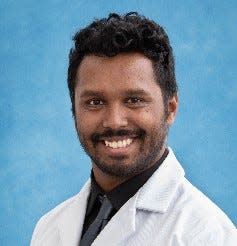Bill would throw the lives of Ohioans in jeopardy

Celine Rajoulh and Taseen Alam are second-year medical students at the Case Western Reserve University School of Medicine.
During the very first days of donning our freshly-cleaned white coats, we felt an immense sense of responsibility and privilege. Little did we know how intertwined our professional lives would become with tumultuous Ohio politics.
Meeting one of our first patients, “Jenny,” we fervently hoped that her care involved something taught in the first year of medical school.
Unwelcomed in Ohio. Leaders working to make state less attractive, not more | Our View
Jenny had just undergone an abortion due to a terminal ovarian cancer diagnosed early in her pregnancy.
The gravity of her decision was palpable in her tearful eyes as she recounted choosing her own life over her much-desired pregnancy.
With unwavering intensity and a hand gripping the edge of her chair, Jenny imparted this wisdom: “I know you’re learning, so let me tell you the most important thing to learn. The doctors that helped me choose to get an abortion are the ones that saved my life. Learn how to have those difficult conversations, and you will save so many lives in your career.”
Ohio politicians are currently engaged in their own challenging conversation, one that will profoundly impact the quality of our medical education and practice on a national scale.
The proposed Higher Education Enhancement Act — Senate Bill 83 — hides behind the guise of safeguarding free speech while actually restricting important diversity, equity, and inclusion programming.
Cirino: Senate Bill 83 'firestorm' clouds fact that it will rein in college tuition costs
Worthington mother: An abortion saved my life and made the family I have now possible
In addition to promoting the dissolution of cultural identity groups, it proposes a blanket ban on discussing "controversial topics'' in educational settings, specifically mentioning the subjects of climate change, systemic disparities, and reproductive health.
This legislation will restrict our ability to have difficult dialogues with ourselves, with our colleagues, and with our patients.
Senate Bill 83 is a danger to patients
The present bill fails to clearly define the criteria for labeling a topic as "controversial" or "political," opening the doors to extensive governmental overreach and unnecessary interference in medical education.

A topic as fundamental to medicine and public health as vaccinations could be labeled as controversial under the current proposal, leading to a requirement for teaching anti-vaccination rhetoric alongside scientifically-supported medical practices.
The consequences of such an infringement on the educational process could be devastating, undermining the integrity of medical education, jeopardizing patient safety, and increasing the burden on our already reeling healthcare system.
As medical students, our concern with this bill is rooted in the profound impact it could have on the quality of medical education within Ohio and the implications it might hold for medical practice on a national level.
More: ‘We knew that she would have a bright future.’ Why are so many babies dying in Ohio?
The medical field is far more than just scientific facts and clinical procedures; it involves the deeply personal, emotional, and vulnerable aspects of patient care that require nuance and compassion.
To become truly empathetic and capable physicians, it is crucial for us to receive exposure to different perspectives that shape our understanding of patients’ lives and cultural contexts, allowing us to provide better healthcare to our diverse communities.
Higher Education Enhancement Act part of a 'troubling trend'
The act is emblematic of a troubling trend of bills gaining traction across the nation.
Bills like Texas's House Bills 1 and 5127, North Carolina's Senate Bill 364, and Florida's House Bill 999/Senate Bill 266 undermine diversity and inclusivity within a nation that prides itself on being a melting pot of cultures and values.
The negative ramifications of such bills jeopardize our ability to participate in a medical workforce that truly reflects the rich tapestry of our society.

Research conducted by the National Medical Association revealed that diversity within the healthcare sector has a notable positive impact on both team effectiveness and patient outcomes. To illustrate, the disparities between Black and white newborn survival rates are significantly mitigated when Black physicians care for Black newborns. Representation kindles hope and trust among the population, affirming that they have a place within the healthcare landscape.
While Jenny received the care she needed in Ohio, future patients may not be as fortunate under this bill.
The prospect of visiting a doctor's office is already intimidating– now imagine the added anxiety of dealing with a medical team that is completely out of touch with your background and experiences. Our dedication to representation is not driven by political agendas but by an earnest desire to create an environment where patients can safely seek care without fear of judgment or condescension.
The Higher Education Enhancement Act deprives aspiring doctors of a skill that's paramount for their future practice, while also robbing patients of having doctors that speak their language.
The Higher Education Enhancement Act, and any bill like it, is a threat to healthcare nationwide and needs to be treated as such.
Celine Rajoulh and Taseen Alam are second-year medical students at the Case Western Reserve University School of Medicine.
This article originally appeared on The Columbus Dispatch: Bill would have profound impact on health of Ohioans

